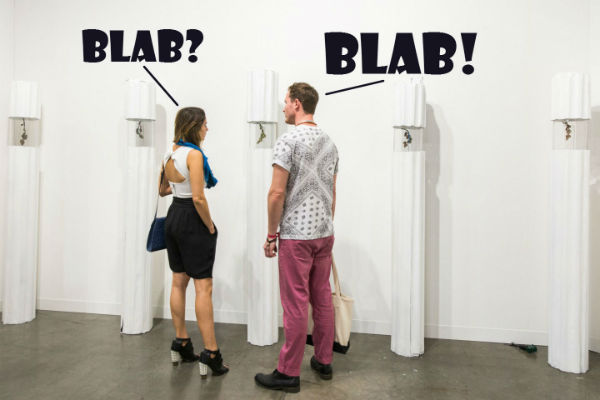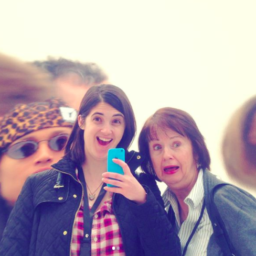

If there is one thing people love to do it is to hate ArtSpeak, the stiff, sub-academic patois of curators and museum wall labels everywhere.
But in truth, ArtSpeak is not the form of linguistic showmanship that is most characteristic of the cocaine-and-glitter hurricane that is Miami Art Week. True, fairs play host to panel discussions, which offer artfully curated bursts of academese.
But in general, ArtSpeak is not the lingua franca of an event like Art Basel in Miami Beach. Instead of mocking the Miami art scene for being pretentious, people mock it for being shallow. Take a glance at Vanity Fair‘s “10 Recommended Pickup Lines for Art Basel.”
This is really another genre, quite distinct from ArtSpeak. I call it ArtBlab.
This form of speech lacks entirely the laborious high seriousness of the much-ridiculed ArtSpeak. In fact, just the opposite. ArtBlab is the chipper simulation of considered opinion. Call it conversational tofu.
Everyone, in my experience, indulges in a bit of ArtBlab at such events, because the sheer breadth and frenzy of them leaves little room for deep reflection but demands plenty of talk. I blab, you blab, we all blab together. Still, I hypothesize that as the art scene has evolved, ArtBlab has become more and more pervasive as a phenomenon.
But how do you spot it? How do you know whether you are having a conversation about art or just, you know, art-blabbing? Next time you find yourself at a fair or an opening, see how much of the discussion falls into one of these categories:
—Conversations that are just lists of artists “liked,” the verbal equivalent of listicles.
—Opinions about those artists that are really just adjectives without much more behind them: “it’s genius,” “lovely,” or, if the speaker is trying to sound smart, “really strong work,” or “challenging!”
—Deeper-seeming opinions that turn out to be just more piles of adjectives: “Really cool, vital work; 100 percent original. Super-relevant.”
—Chatter about the general atmosphere, which is the art-scene equivalent of farmers talking about the weather. “The lighting’s a lot better then last year.” “There’s certainly a lot of painting!” “Isn’t the space just gorgeous?”
—Talk about art or artists that is really just art-scene trivia: “Did you hear that Guy Fieri bought a piece?,” “She was in Haute Surfer magazine’s ‘Emerging Art’ issue,” “I hear this artist once split a cab with Jeff Koons!”
—Explanations of art where every point of comparison is Damien, Jeff, Marina, or Banksy. Or Ai Weiwei. If you’re lucky.
—The ultimate ArtBlab trope: Talk about talk. “People are saying” something is important. There’s “a lot of buzz.” Sometimes, even, “everybody” is talking about something. So it must be important!
Such is ArtBlab. You would be amazed at how much mileage you can get just stringing such things together.
And yet we still haven’t gotten to the heart of the matter. Because, as anyone who has been in the thick of it can attest, 90 percent of all talk around contemporary art is not even about the art itself in this vague way. It’s about what you are doing after the art.
The strenuous seriousness of old-timey ArtSpeak is all about gesturing in the direction of the academy. It tends to serve as alibi to a kind of dour, pokerfaced art that is essentially reducible to being an illustration of the concepts behind it. In that sense, the actual work is just a prop for ArtSpeak.
The same is true of ArtBlab, it’s just a different kind of prop. ArtBlab pairs best with art that, as someone once said of Koons, aspires to “a lavishly elevated version of mass-cultural charisma.” The kind of art that makes a great centerpiece for an “invite-only” event sponsored by a liquor brand.
ArtBlab is talk about art that’s a pretext for something else. It reflects the truth that for a growing and robust constituency, these kinds of events are about art in exactly the way that toga parties are about the culture of ancient Greece.






